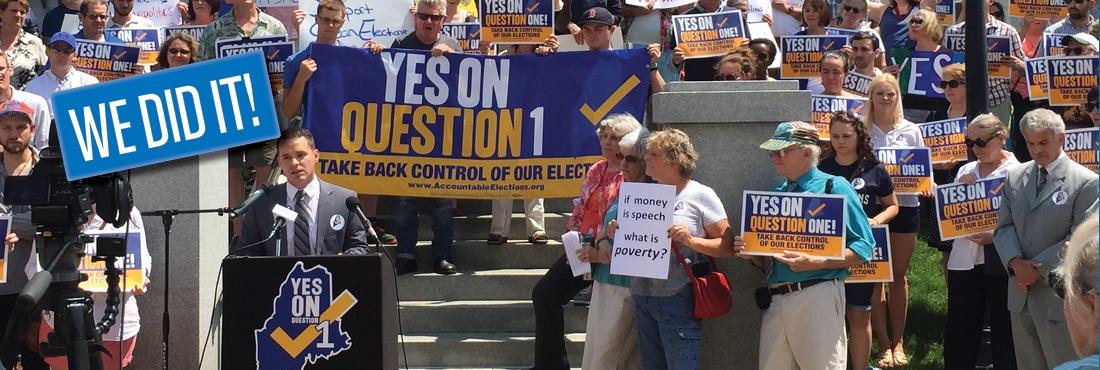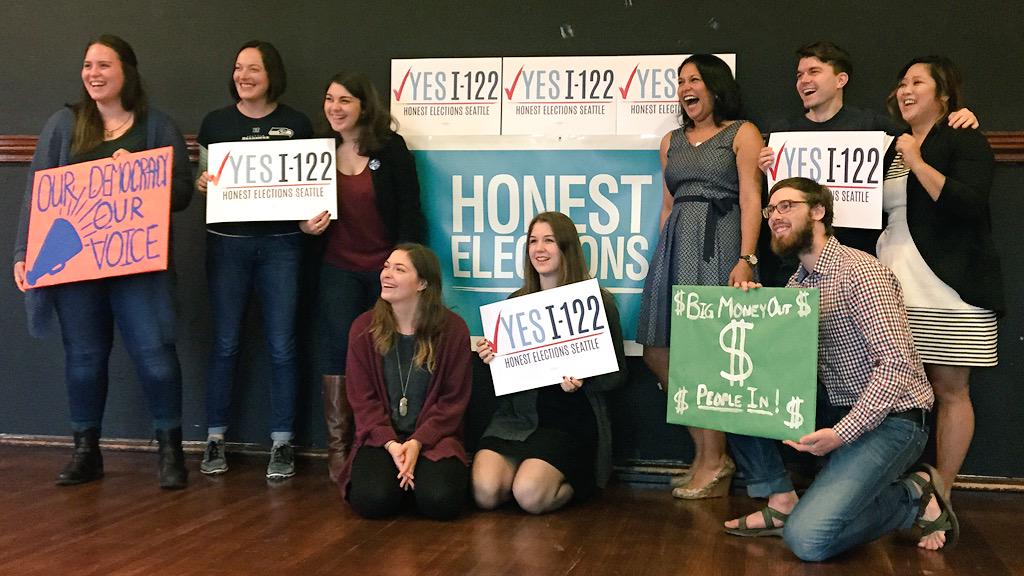This past November witnessed two key victories for advocates fighting money in politics. Maine voters passed a ballot initiative, by close to a 10-point margin, to strengthen their Clean Election system, to require greater disclosure of outside spending and to increase accountability for those who violate campaign finance laws. In Seattle, advocates passed an innovative, first in the nation public financing system that will give voters four Democracy Vouchers to donate to qualified candidates to support their campaigns as well as a host of tough reforms that will increase transparency and set strict limits on campaign spending.
Piper Fund and Piper Action Fund provided over $1 million in total support for these efforts. These victories, along with recent successes—also supported by Piper Action Fund—in Montgomery County, Maryland and Montana, point towards new momentum for state and municipal reform.
As funders and the field examine the next set of campaigns for potential victory in 2016 and beyond, the Piper team has been reflecting on lessons for our own grantmaking moving forward. I wanted to take a moment to share our thinking with you in the spirit of dialogue and collaboration. Here are three key lessons we have reflected upon.

Long-term engagement is key to building a strong campaign
Piper’s grantees in both Maine and Seattle did outstanding work to engage the public and pass these two ballot measures. Both partnered with national organizations, drew upon new messaging research to craft their narratives, and engaged with the grassroots, directly communicating with tens of thousands of voters.
The Maine advocates had an advantage going into the campaign: support from Piper for the past ten years to defend the existing Clean Election Act, which enabled them to build long-term relationships with traditional and nontraditional coalition partners and high level stakeholders, and to develop statewide infrastructure long before the ballot measure campaign was underway. Advocates were also defending and strengthening a popular law, and had spent years educating and engaging the public, which provided a significant advantage at the outset.
Seattle advocates had certainly been working to build infrastructure, but without national money in politics support prior to last year and with coalition partners primarily consisting of multi-issue organizations taking on a variety of campaigns, this work relied heavily on volunteers. These constraints placed more pressure on the Seattle campaign to ramp up through the different phases of the effort much more quickly.
Because of the complexity of building a coalition to promote public financing that involves developing policy encouraging new, qualified candidates to participate; identifying funding sources that do not open the door to opposition arguments; and building consensus on policy within a broad-based coalition, it is crucial to provide support for a planning process, particularly in states that have not benefitted from long-term funding. As was done in Seattle in late 2014, such a process should bring together local organizers, national advocates and funders, who bring critical experience and knowledge to the table.
Wherever possible, we should also look well beyond 2016, and even 2018, as we eye support for local advocates to plan future campaigns, to ensure that advocates are able to thoughtfully build needed infrastructure and engage in campaign planning in a deliberate way. To that end, in addition to funding active campaigns, Piper and our allies will explore opportunities beyond 2018 to begin to build needed infrastructure now.
Planning ahead for implementation and defense of wins is important
On the flip side, it is equally important to consider implementation costs associated with campaigns at the outset, and to ensure that successful campaigns have the funds in hand to protect and implement their wins.
Almost immediately after the ballot measure passed in Maine, for example, advocates sprung into action to ensure that the system is fully funded, to educate the public about the changes implemented, and to implement changes to regulatory bodies. Seattle advocates are putting the finishing touches on a plan to implement the voucher system and advise diverse constituencies in how to utilize it.
Implementation is costly, but passing ballot measures without the ability to defend and implement them is wasted effort. As recently as November, Piper grantees in Connecticut were working to defend that state’s well-respected public financing system. The need to implement and defend these policies is a long-term one. We must ask: how can we both continue to look at additional opportunities to build momentum, while also ensuring that previous years’ campaigns get the support they need to fully implement their wins?
One answer, of course, is to raise more funds. We all know that the money in politics sector is not yet funded at a level that matches the momentum that is building across the country. Piper and our allies are actively working to bring more resources to the field, and as we do so, it will be important to raise adequate resources for implementation of wins.
The other answer is to plan well ahead and include implementation costs up front in the budgets for campaigns. Moving forward, we at Piper will be asking grantees to consider likely implementation costs, and identify potential costs of implementation as one factor in evaluating and funding campaigns. We are also beginning a conversation about establishing rapid response funds at Piper and Piper Action Fund that would have the flexibility to meet the implementation needs of successful campaigns as wins come under attack.

Engagement of the New American Majority is important and will require a shift in approach
As we look to build a broader, more diverse and more impactful movement, we have an opportunity to learn from Seattle, where communities of color played such a key role in the victory.
More specifically, Seattle provides an opportunity to question common assumptions that grant makers and the field have held. For example, the conventional political wisdom that communities of color and the New American Majority are less likely to turn out to vote in ballot measure campaigns or are significantly less engaged around the issue of public financing, was repeatedly disproven in Seattle—where it was communities of color that came close to passing public financing without significant foundation support in 2013, and where those same communities engaged with the issue enthusiastically in 2015.
Unfortunately, conventional wisdom often leads campaigns to shift resources to voters they believe most likely to turn out, excluding key communities of color that are most impacted by the issue of money in politics. Early engagement and dialogue with these communities during the policy development phase of the campaign, and an understanding of how money in politics connects to issues that matter most, is key.
Seattle also offers lessons about the challenges inherent in building out a broader coalition; in this case, both local and national advocates worked to ensure that the coalition would hold together and be impactful, even as new voices raised important challenges. As funders, we need to consider how best to hone our grantmaking to continue to engage these communities.